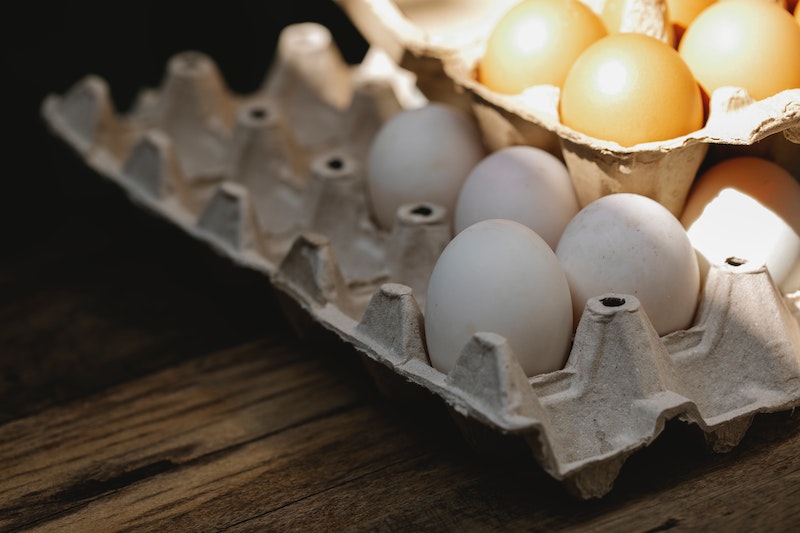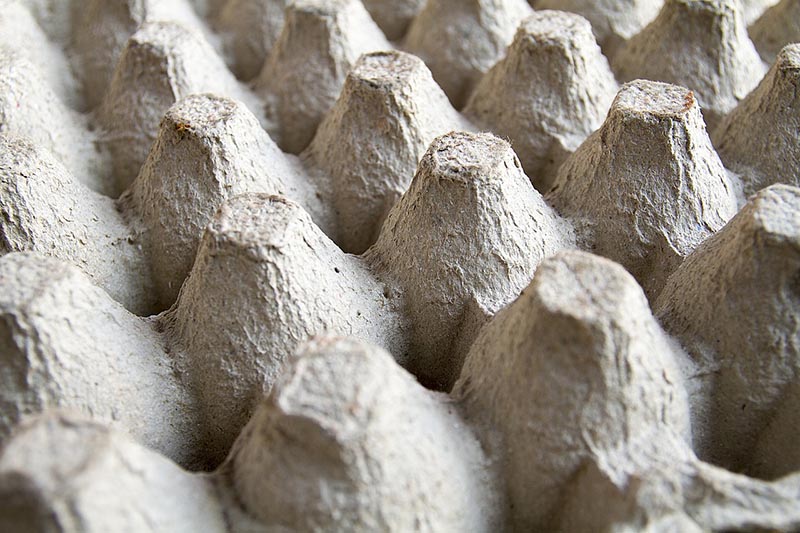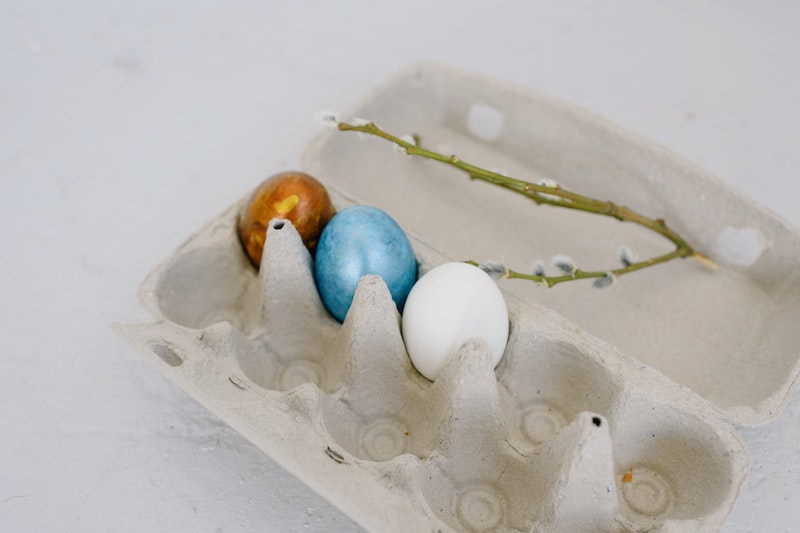Are Egg Cartons Recyclable? Proper Disposal Way
-

- Last updated:

Everyone knows that “reduce, reuse, recycle” is the secret to sustainability. But if you’re not paying attention to the order, you’re likely doing it wrong.
Relying on recycling to reduce your footprint before changing your buying habits isn’t as impactful as we like to believe, and you don’t have to look beyond the average egg carton to see why. Egg cartons are generally recyclable, but chucking them in the magical blue bin is often a surprisingly wasteful way of disposing of them.
Are Egg Cartons Recyclable?
Egg cartons come from various recycled cardboard, paper, and plastics. The most common types of egg cartons are paper pulp and polystyrene (Styrofoam), two cheap and practical materials in use for decades. In recent years, polyethylene terephthalate (PET) plastic has caught on among many organic egg providers.
Most egg carton materials are recyclable, including polystyrene. That doesn’t mean that they’re equally easy to recycle. Even though you may see the chasing arrows on your container, your local recycling program often won’t process certain items, and you might as well toss them in the trash if you can’t reuse them.
Can You Recycle Paper Pulp Egg Cartons?

Paper is one of the most recycled (and recyclable) materials in the United States. Although they account for roughly 23% of the total municipal solid waste generated in the U.S., paper and paperboard make up more than 66% of all recycled materials.
Paper pulp is an attractive option for many egg suppliers due to its low price and environmental friendliness. Standard printer paper can go through recycling 5–7 times before the fibers become too short to reuse. At that stage, it gets mashed into pulp to make other paper products, including newspaper and egg cartons.
You can recycle a paper egg carton with the recycling symbol, which you can often find on the container’s underside. Recycled fibers will eventually become unusable, so some egg cartons won’t have the recycling symbol and will instead need to go in the trash. Most local recycling systems accept recyclable egg cartons in the blue bin as long as they are clean and disposed of correctly.
Americans are better at recycling paper than any other material, as only 11.78% of landfill trash consists of paper products. Keeping landfilled waste down may seem inconsequential because paper decomposes harmlessly in nature, but when it sits in a landfill, the anaerobic breakdown releases methane. The greenhouse gas can trap 80 times the amount of heat as CO2 in the first 20 years of sitting in the atmosphere, driving up to 25% of global warming.
Can You Compost Paper Egg Cartons?

A paper carton is the most likely type of egg container to make it through another round of use after you toss it in the blue bin. But after several runs of reprocessing, the broken-down paper won’t be worthy of the recycling symbol. Rather than throw it away so it will end up in the landfill and contribute to GHG emissions, there’s still one more path to repurpose it in an eco-friendly way.
Home gardeners can squeeze more use out of old paper egg cartons by putting them in the compost. Break down your old paper egg cartons as brown components to feed the microbes in your compost pile. Shredding them into small pieces will expedite their decomposition, which takes about 2–4 weeks.
Egg cartons must be cleaned before entering the compost. Decomposing food can give off foul odors to attract pests, so you don’t want to add a carton covered in old egg yolk. A hot pile can handle a little egg, but if you stored dripping cracked shells in the carton, you need to throw it away.
Can You Recycle Polystyrene Egg Cartons?
Despite many polystyrene foam egg cartons sporting the universal recycling symbol, they are rarely recyclable. Polystyrene is a #6 plastic, which you’ll note by the small “6” within the recycling sign on the carton. Since the foam is a petroleum-based product, you can technically recycle it, but most local recycling facilities lack the proper equipment to break it down.
Polystyrene is more than 90% air, making it lightweight and protective. But the material return on a single egg carton is so low that it’s generally not worth the collection and processing effort.
Don’t contaminate your blue bin with unrecyclable EPS egg cartons. Check with your local grocery stores for take-back options. You can also reference the Foodservice Packaging Institute’s EPS Recycling Map to find a business or organization that will take your old cartons off your hands. When all else fails, you’ll have to bite the bullet and toss the carton in the trash.
Can You Recycle PET Egg Cartons?
Like polystyrene, PET will take over 400 years to break down in the landfill while releasing chemicals and microplastics into local ecosystems. But in contrast to its foamier counterpart, PET is the #1 plastic and nearly as recyclable as paper products.
You can recycle PET egg cartons in your blue bin for curbside pickup, as long as it is clean and has the “1” recycling logo. PET can run through recycling processing up to seven times while requiring fewer resources and producing fewer GHG emissions than virgin PET materials.
Many organic and free-range egg suppliers like Nellie’s Free Range Eggs support take-back programs to reuse old cartons. If you live in an area that doesn’t have a recycling facility or want to ensure your plastic egg cartons go back into the system and not into a landfill, this could be the best way to dispose of them.
The Problem with Recycling Egg Cartons

It sounds easy enough to recycle plastic egg cartons, which can make America’s actual recycling numbers seem a little confusing. The country’s success with paper recycling doesn’t extend to plastic, as only 4.47% of the plastic waste generated in 2018 reached recyclers. While 3 million tons went toward recycling, nearly 27 million tons ended up in landfills.
The issue has less to do with personal responsibility and more to do with broken infrastructure. You can clean the egg carton and put it in the blue bin, but there’s still no guarantee it’s going anywhere but the landfill.
One critical issue is that China and other traditional depots for America’s recyclables have cut the country off in recent years. With nowhere to put a growing collection of plastic trash, America’s recyclers can’t keep up with the demand nor supply the water and energy to make it happen.
The other problem is single-stream recycling. Unlike multi-stream systems, where the consumer puts metal, plastics, and paper products into separate bins, the single-stream system makes life as easy as possible by shipping one pile to a processing facility to sort out the mess.
Single-stream made recycling easier for the average consumer, leading to increased recycling rates. Unfortunately, contamination from unrecyclable materials and dirty items leads to “residuals” (pieces that weren’t recycled) of up to 27%. Meanwhile, multi-stream systems have residuals of only 1%. It saves time and money, but a single stream is far from perfect, and its failings make quite a difference in our pollution rate.
How to Save and Reuse Egg Cartons
You can usually recycle your paper or PET egg cartons, but it’s anyone’s guess as to whether it becomes something new or another piece of landfilled trash. In many cases, repurposing the egg cartons yourself is the most eco-friendly way of getting rid of them.
If you compost a lot, paper egg cartons are the way to go, and you can feel at least a little better about reducing your carbon footprint. For non-gardeners, you have plenty of creative ways to reuse egg cartons.
- Store jewelry, sewing supplies, beads, and other small items
- Shred into fire starters
- Use for craft projects
- Start seeds
- Use as a paint palette
- Store hardware
You could also consider buying eggs from local farmers. Supporting small operations gives you a chance to use old egg containers or make reusable carriers, bringing your footprint close to zero.
Final Thoughts
Egg cartons can put a lot into perspective, particularly those mechanisms we take for granted. Recycling is imperfect, and each material has a far greater impact on the planet than what shows up in a landfill. From production to use to disposal, there’s a better, more eco-friendly option at every stage. And while we can’t control the entire process, we all have a part to play in making a stronger effort and reducing our carbon footprint, one egg carton at a time.
Featured Image Credit: klaus-nielsen, Pexels
Contents


